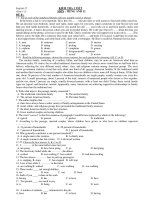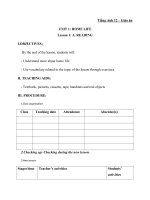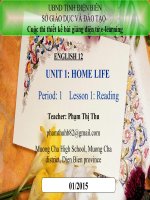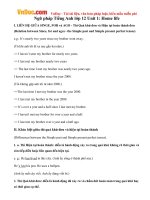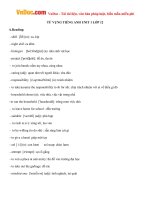unit 1 home life tiếng anh 12 giáo án
Bạn đang xem bản rút gọn của tài liệu. Xem và tải ngay bản đầy đủ của tài liệu tại đây (436.39 KB, 31 trang )
Tiếng Anh 12 – Giáo án
UNIT 1: HOME LIFE
Lesson 1: A. READING
I.OBJECTIVES:
By the end of the lesson, students will:
- Understand more about home life.
- Use vocabulary related to the topic of the lesson through exercises.
II. TEACHING AIDS:
- Textbook, pictures, cassette, tape, handouts and real objects
III. PROCEDURE:
1.Class organization:
Class Teaching date Attendence Absentee(s)
2.Checking up: Checking during the new lesson.
3.New lesson:
Stages/time Teacher’s activities Students’
activities
WARM UP * Chatting:- Ask Ss to talk about their family:
1. How many people are they in your family?
2. What is your father’s / your mother’s job?
- Go round the class and control
- Call on some Ss to present .Then T gives
feedback
- Short introduction the types of family (show
the pictures)
+ Nuclear family: consists of the father, the
mother, and the children
+Extended family: consists of the grandparents,
aunts, uncles, cousins, nephews, nieces, and in-
laws, (relatives through marriage).
+Single parents families: A single parent
family consists of the children and one parent
either the father and the mother.
- In USA, single parent families are popular
- In Viet Nam , there are more and more the
type of single families.
+Blended families or stepfamilies:A family in
which both parents have been divorced, each
with their own children they remarry and bring
- Group work
- Discuss
- Present
- Listen to the
teacher’s
explaination
BEFORE
READING
WHILE-
READING
both sets chilren into the marriage. It consists of
stepparents, stepsister,stepbrother,halfbrother
and half sister.
- Have SS to look at the picture (P12) and
answer questions:
1. Who do you think they are?
2. Where is the family?
3. What is each member doing?
4. How do you feel when you see such a warm
and peaceful scence?/the scence of a family
where people love and support each other?
- Call some pairs to answer and give feedbacks.
- Introduce the text.
*Explain some new words:
+ Caring(a) + To be willing to
do st.
+ Mischievous(a) + Obidient(a)
+ Close-knit(a) + Supportive(a) ~
of
- Work in pairs.
* Suggestion:
1. Parents and
children.
2.At home.
3.The mother is
helping the
daughter with her
study, the father
is playing with
the son.
4.(depend on Ss.)
-
- Copy down
then repeat after
T
+ Frankly(adv) + Secure(a)
- Read aloud these words and ask Ss to repeat
- Explain new words in Vietnamese if necessary
- Ask Ss to listen to the tape.
- Ask Ss to read the passage silently to
understand about it
*Task 1 : Choose the best answer
- Get Ss to read the requirement of task1.
- Ask Ss to read through 5 sentences and T
helps them if necessary.
- Ask Ss to work in pairs and choose the
answer.
- Get Ss to share the answers with their groups.
- Call 2 Ss of 2 groups to write down the
answers.
- Check and give feedbacks:
- Let Ss explain some sentences if necessary
*Task 2 : Answer the questions:
- Check if Ss can answer the comprehension Qs
- Read the
passages
- Listen to
teacher’s reading
or tape
- Read the text by
self.
- Read the task.
- Read through 5
sentences.
- Work in pairs.
- Share the
answer.
1-B; 2-C;
3-A; 4-B ;
5-A;
POST-
READING
without reading the text again. If Ss cannot, T
gets them to read the Qs carefully and underline
the key words to do task.
- Get Ss to check theirs answers and explain
their choices.
- Call some Ss to read theirs answers and
explain their choices.
- Comment and gives feedback:
1. Very busy. They have to work long hours
and sometimes they have to work at night.
2. She is always the first one to get up in the
morning to make sure that her children leave
home for school having eaten breakfast and
dressed in suitable clothes. She always makes
dinner ready before her husband comes home.
3. The daughter helps with household chores:
she washes dishes and takes out the garbage.
She also looks after the boys/her younger
brothers. The father sometimes cooks/does
some cooking or mends things around the house
at weekends.
4. She attempts to win a place at university.
5. Because they are very closed – knit and
- Work in pairs
Work in groups.
- Check.
- Work in groups.
- Report their
ideas.
- Listen and
comment.
supportive of one another. They often share
their feelings and whenever problems come up,
they discuss them frankly and find solutions
quickly.
-Give Ss handouts and ask them to fill in the
table the missing information from the reading
text.
-What is your mother/father/you responsibility
in your family?
Work father mother children
- Washing
dishes
-Cooking, …
- Aks Ss to compare the family described in the
text with your own family (basing on the
handouts).
- Ask the secretary to report their ideas.
- Comment and corrects Ss’ mistakes.
- Tell each group
to choose a
secretary to note
down all of
others’ ideas.
-The secretary
report their
ideasin front of
the class
4. Consolidation: Retell the main points of this lesson
5. Homework:
- Ask Ss to learn the new words by heart, read and translate the text, do the
tasks again.
- Prepare the section B: Speaking
UNIT 1: HOME LIFE
LESSON 2:B: SPEAKING
I.OBJECTIVES:
By the end of the lesson, students will:
- Understand more about home life, the relationship and responsibilities of
family's members.
- Develop speaking skills: discuss home life, the relationship and
responsibilities of family's members.
II. TEACHING AIDS:
- Textbook, pictures, cassette, tape, handouts and real objects
III. PROCEDURE:
1. Class organization:
Class Teaching date Attendence Absentee(s)
2. Checking up: Checking during the new lesson.
3. New lesson:
4.
Stages/time Teacher’s activities Students’
activities
WARM UP
(7 mins)
PRE
SPEAKING
(5 mins)
* Network
- Ask Ss to find out as many as possible words
related to household chores.
- Call some Ss to write on the board.
- Give comments.
*Task 1: Read the following statements and
tick the ones that apply to you and your
family.
- Ask Ss to work in pairs, exchange the ideas.
- Walk around and help them.
- Call some Ss to talk about their families in
front of the class, using the information in task
- Work in pairs
- Present in front
of the class
Expected words:
+ Cleaning the
floor
+ Cooking
+ Doing the
washing up
+ Washing
clothes
+ Tidying the
kitchen
+ Ironing clothes
+ Hanging dry the
clothes
+ Taking care of
the baby
+ Repairing/
mending things
+Taking out the
garbage
Household chores
WHILE
SPEAKING
(20 mins)
1.
- Give feedback
In my family both my father and mother
go to work. Almost all members of my family
share the household chores. Washing the
dishes and cleaning the house are what I often
do help my parents. We all like watching films
on TV when we have free time at weekends.
The person I often share my secrets with is my
sister. I always ask my parents for advice
before making an important decision.
*Task 2:Prepare a list of questions to aks
another Ss to find out whether his/her family
life is like your:
- Guide students how to practise- Help the
students with new structures.
Give some special expressions
+Could you tell me who… ?
+ By the way who in your family ……. ?
+What about your …. ?
* Note: The difference between two question
forms:
- Work in pairs.
- Tick the ones
that apply to Ss’
family.
- Exchange the
ideas.
- Work in paris
- Some pairs of
student report
POST
SPEAKING
(10mins)
+ Khi what/who làm S thì V chia ở ngôi thứ 3
số it và không dùng trợ động từ.
+ Khi what/who làm O thì phải dùng trợ
động từ.
- Walk around and help them.
- Call some pairs of student to report before
the class.
- Correct their mistakes.
*Expected questions :
1. Could you tell me who works in your
family?
2. By the way who in your family does the
washing up?
3. What about your brother ? Does he share
the household chores?
4. What’s your responsibility in the family?
5. What exactly do you have to do?
6. How do you share the household chores?
7. What interests do your family members
share together?
8. What do your family members often do
before the class
*Sample dialogue
:
A: - Hi,…Could
you tell me a bit
about your family
life ?
B: - Sure, no
problem.
A: - Who works in
your family?
B: -Both my
parents. My father
is an engineer and
my mother is a
teacher. They
work 8 hours a
day.
A: Do you help
them with the
household chores?
B: Of course. I
help my mother in
the kitchen and
together in your free time?
9. Who do you often share your secrets with?
10. Who do you often talk to before making an
important decision?
*Task 3 : Ask about your partner’s family.
- Ask Ss to study the table carefully.
- Have the Ss to work in pairs, asking about
the partner family life, noting down the
answers in the table.
- Call some pairs to act out in front of the
class.
- Give comments.
* Task 4:Report the information
- Have Ss to work in pair.
- Call some Ss to report in front of the class.
- Correct and give comments.
*Expected answer:
I’ ve just talked with B about her family
life.She told me that both her parents go to
work, so they are very busy. So she has to
wash the dishes.
A: What about
your father?
B:He cleans the
floor and
sometimes when
my mom is out of
on business he
cooks for us.
A:What interests
do your family
members share
closely?
B:Watching films.
We often watch
films on TV on
Saturday evening
when everybody is
free.
A: Who do you
often share your
secret with?
B:Mother.I think
she understand me
shares the household chores .She often helps
her mother in the kitchen and washes the
dishes after meals. His father is also willing to
help with the housework. He cleans the house
and sometimes when B’s mom is out on the
business. All the members of her family enjoy
watching films together on Saturday evening.
She shares her secret with her mother because
she thinks that her mother understand her
well; Hsowever, both parents help her make
important decisions
well.
A:So she is the
person you often
talk to before
making an
important
decision?
B: No, in fact both
my parents help a
lot when I have
problems.
A: You must be
very happy in
such a family
.Thanks for giving
me time. Bye.
B: - Bye.
4. Consolidation: (2mins)
- Retell the main points of this lesson.
5.Homework: (1min)
- More practice the main topics at home.
- Prepare the section C (The Listening part of Unit one).
Unit 1: HOME LIFE
Lesson 3: C: LISTENING
I.OBJECTIVES:
By the end of the lesson, students will:
- Understand more about home life
- Develop listening skills: listening for main ideas and specific information.
II. TEACHING AIDS:
- Textbook, pictures, cassette, tape, handouts and real objects
III. PROCEDURE:
1.Class organization:
Class Teaching date Attendence Absentee(s)
2.Checking up:Checking during the new lesson.
3.New lesson:
Stages/time Teacher’s activities Ss’
activities
WARM UP *Jumbled word:
(5 mins)
BEFORE
LISTENIN
G
(10mins)
- Rearrange the letters to make a meaningful word:
RINENOU
- Which word can go with “reunion”?
* Describing the picture.
- Ask students to work in pairs, look at and describe
the picture (p16), using the cues:
1. What is happening in the picture?
2. How many pictures are there?/ who are they?
3. How are they feeling? / How do they look?
- Call some students to answers
- Give feedback and introduce the topic of the lesson:
Lead- in: In today’s listening section, you’ll hear
the conversation between Paul and Andrea talking
about their family.
Teacher has students pay much attention to the
words and how they’re pronounced and tells students
that they’re given cues helping them to listen to the
text well
* Vocabulary: (Listen and repeat)
+Leftovers / `left әu vәz/: food that has not been eaten
->
REUNIO
N
->Family
reunion
- Look at
the pictures.
- Answer
the
questions.
+ They are
having a
big meal.
+ 9
people
+ Very
happy
WHILE
LISTENIN
G
(20mins)
at the end of a meal (thức ăn thừa)
+ Spread ( v) out /spred/ = to cover a large area : trải
ra
+To reserve: = to book sth in advance: đặt trước
+Flight(n) = a journey made by air : chuyến bay
*Task 1: Listen to the conversation between Paul and
Andrea and decide whether the statements are T or F
and then correct the false statements.
- Ask students to read through the questions
- Play the tape two times
- Ask Ss to do individually then compare the answer
with a partner.
- Play the tape again, have students listen and check
the answers
- Call some Ss to give the answers
- Checks and gives feedback.
Answer
1. T
2. F ( They not a very close nit family, they rarely get
together as a family any more.)
- Students
pay much
attention to
the words
and how
they’re
pronounce
d
- Students
listen to
the tape
carefully &
repeat
individuall
y and in
chorus
- Read
through the
questions
3. F ( It is about 180 kilometers from they ….)
4. T ( There are 4 children in Paul’s family)
5. T ( There are too many people to cook for, they end
up going out to dinner a lot.)
*Task 2: Note down two things that are different
about Paul’s and Andrea’s families.
- Ask students to read through the questions.
- Let them do the task without listening again.
- Play the tape twice .
- Ask students to do Task 2 then compare the answer
with a partner.
- Play the tape again, have students listen and check
the answers.
- Ask some students to read the answers.
- Check and gives feedback.
Paul Andrea
His family members are
not very close.
His family is a close - knit
one.
The families often eat the The family often goes out
- Work
individuall
y to do the
task
- Compare
the
answers
- Read
through the
questions.
-Work
individuall
y
AFTER
LISTENIN
G
(7mins)
meal the mother cooks at
home.
to eat when they get
together.
*Discussion:
- Ask Ss to work in groups, discuss the importance of
family in a person's life
- Ask some Ss to present their discussion in front of
the class.
- Give feedback.:
Family is very important. It’s a place where
people can share their secrets and find solutions to
problems that arise. Only in family, we can enjoy love
and comforts. We are sure to be welcome back when
we have disappointments or failures in life.
- Try to do
the task
without
listening
again.
- Compare
the
answers
- Listen
again and
check the
answers
- Work in
groups,
discuss the
questions
- Report
their
discussion
4: Consolidation:(2 mins)
- retell the main points of this lesson.
5. Homework:(1min)
- Ask Ss to summarise main points.
- Write about family reunion.
- Prepare Part D. Writing of unit 1
Unit 1: HOME LIFE
Lesson 4: D. WRITING
I. OBJECTIVES:
By the end of the lesson, students will:
- Understand more about home life
- Develop writing skills: Writing for main ideas and specific information
II. TEACHING AIDS:
- Textbook, pictures, handouts and real objects.
III. PROCEDURE:
1.Class organization
Class Teaching date Attendence Absentee(s)
2.Checking up:Checking during the new lesson.
3.New lesson:
Stages/time Teacher’s activities Ss’ activities
WARM UP
(5 mins)
PRE
WRITING
(7 mins)
* Chatting:
- Ask Ss to work in pairs and answers some
questions
1. Do your parents often let you go out in the
evening ?
2. Are you allowed to use your family
motorbike?
3. Are you allowed to do the household
chores?
- Call on some pairs to present their answer in
front of the class
- Feedback
*Lead in : In today’s lesson, you’re going to
write a letter about your family rules
*Task 1: What rules do you have in your
family?
- Have students revise the verbs :
+) Let sb + V
+)Allow sb + to V
+) Have to + V (obligation)
+) Permit sb + to V
- Deliver Ss handouts :
- Pairs work
1. My parents
don’t let me
come home late.
2. My father
permits me to use
the family
motorbike.
3. I have to do the
household chores.
- Ss work in
groups
* Suggested
answers:
1 to come
home late / watch
TV …
2. clean my
house / do the
washing
WHILE
WRITING
(25mins)
Complete tthe following sentences.
1. During the school year, I am not allowed
………
2. I have to…………………………
3. My parents allow me……………….
4. My parents want me not………………
- Ask some Ss to go to the board to write down
their sentences
- Together with Ss finds out the mistakes and
corrects .
*Task 2: Write a letter to a pen pal about your
family rules.
- Ask Ss to work in groups and use the ideas
they have written above to write a letter about
their family rules.
- Goes around to offer help.
- Call four representatives of four groups to go
to the board to write down their letters
- Together with Ss finds out the mistakes and
corrects them
- Give feedback on Ss’ work by pointing out
3. to watch
TV / go out with
my friends on
Saturday or
Sunday…
4. to stay up
late / chat with
my friends on the
phone
- Ss work in
groups and use
the ideas they
have written
above to write a
letter about their
family rules.
POST
WRITING
(5mins)
some common mistakes .
- Remark generally Ss’ written work
* Sample writing:
Dear Mary,
Today, I have something interesting to tell you.
It’s my family’s rules. Every family has its
own rules. Mine has a few. First, during the
school year I’m allowed to watch TV until I
have finished my homework. Sometimes my
parents let me go out with my friends on
Saturday or Sunday, but I must come home
early. Second, in my family everybody has to
do their share of the household chores. And
mine are doing the washing and preparing
meals. Third, my parents want me not to chat
on the phone more than ten minutes. How
about your family rules? I am very happy with
my family. My parents really love me and take
good care of me.
Love,
Daisy
- Ask Ss to make a conversation about the
- Ss work in
groups
- Work in pairs
content of their letter
- Call some Ss to practice the conversation in
the front of class
Eg:
A. Do your parents let you go out in the
evening?
B. Sometimes on Saturday or Sunday.
A. Are you allowed to watch TV?
B. ………
4. Consolidation:(2 mins)
- Retell the main points of this lesson.
5. Homework: (1min)
- Ask Ss to rewrite at home.
- Prepare the section E (The Language focus part of Unit one).
